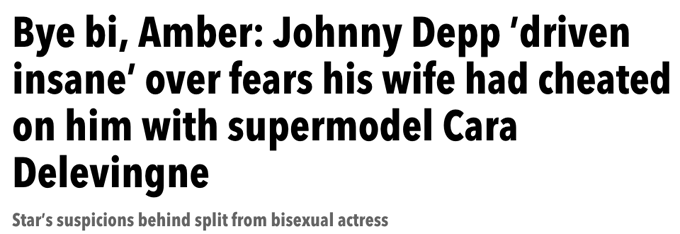
Hey, tabloids, I get it. It probably seems almost irresistible when a rising starlet and her superstar husband break up. You probably pray daily to the divorce gods for such a high-profile split as Amber Heard and Johnny Depp. But then come the added allegations of domestic abuse, restraining orders, and the word “bisexual” and you clearly can’t help yourself. You simply must scream the most salacious, sickening headlines possible.
But, here’s the thing — don’t. Stop. Cut it out. Be better human beings. Your biphobia and sexism are showing and it’s terrible, even for you.
Since Heard abruptly filed for divorce from Depp and then sought and was granted a restraining order citing past and ongoing physical and emotional abuse, we’ve witnessed an onslaught of biphobic assumptions and victim-blaming comments.
The thing is it’s actually not that hard to talk about bisexuality and domestic violence in a smart and responsible way. All one has to do is a) realize the longstanding and pervasive negative stereotypes that unfairly surround bisexual people, and b) realize the longstanding and negative stereotypes that unfairly surround victims of domestic abuse. See, easy.
But, instead, what we’re given is headlines like this from The Sun:

And like this from Hollywood Life:
And like this from The Scottish Daly Mail:

And like this from something called Morning News USA:

Nope, nope, nope, and nooooope. Where do we even start? Well, let’s see, maybe with that her name is Amber Heard not “bisexual wife.”
The thing about this very public situation involving celebrities is how sadly common it is in our society. Women are abused. Bisexual people are maligned. And the cycle continues.
So in an effort to help gossip sites, trashy tabloids, and the media break that cycle and stop falling into the all-too-familiar traps of coverage, here are five very simple rules to follow when talking about bisexuality.
- Bisexuality is a distinctive and real sexual orientation. It is not a phase. It simply means a person is attracted to both men and women. So, no, Radar Online, Heard didn’t “always made her bisexual tendencies quite obvious,” she just is bisexual — period.
- Bisexuality does not end when a person enters into a relationship of someone of the same or opposite sex. They are not now “gay” or “straight.” So, no, National Enquirer, there is no such thing as this “bisexual bride’s lesbian past!”
- Bisexuality does not make it more likely for a relationship fail. A bisexual person is not automatically more likely to stray or be promiscuous. So, no, Hollywood Life, it’s not Heard’s “lesbian friends” who put her “marriage ‘on the rocks,’” but instead more likely the abuse she says she suffered at the hand of her partner.
- Bisexuality does not make someone sneaky or untrustworthy or duplicitous. Again, it just means you are attracted to men and women. So, no, Australian morning show guy, you were totally wrong to say it is “not wise to marry a bisexual.”
- But bisexuality actually does increase the likelihood that a person will experience physical violence from a partner. A study found that 61 percent of bisexual women, 43 percent of lesbians and 35 percent of straight women experienced sexual and intimate partner violence, according to the National Center for Injury Prevention and Control.
Heard, thus far, has done everything people expect and demand from victims of physical abuse — she kept photographic records of her injuries, she had a friend call the police during an attack, she filed for divorce, she was granted a restraining order. The courts will and should decide the legal aspects of this case definitively. Yet somehow — unlike with a more conventional crime like, say, robbery — the overwhelming burden of proof still disproportionately lies with Heard, and not Depp, when it comes to the court of public opinion.
But when you consider the statistics on domestic violence it makes absolutely no sense why we should be so distrustful of victims like Heard. The facts are 1 in 3 women will be the victim of some sort of physical violence from an intimate partner during her lifetime, according to the Centers for Disease Control’s National Intimate Partner and Sexual Violence Survey. Yet only about 26.7 percent of women who are physically assaulted by an intimate partner report it to the police, according to a survey by the U.S. Department of Justice. So, in actuality, most women never even report their assaults out of a myriad of reasons from fear to shame to lack of resources to the very real concern that they’ll be accused of making false accusations.
Yes, tabloids, it may seem fun to make a splash about Heard’s bisexuality and speculate about all her queer female friends. But it does absolutely nothing to further the serious discussion about domestic violence. All it does is, once again, paint bisexual people as the villains — sometimes even of their own tragedies.
Dorothy Snarker is Women and Hollywood’s queer columnist. She writes at dorothysurrenders.com and is a regular contributor at AfterEllen.com. Also find her @dorothysnarker.







